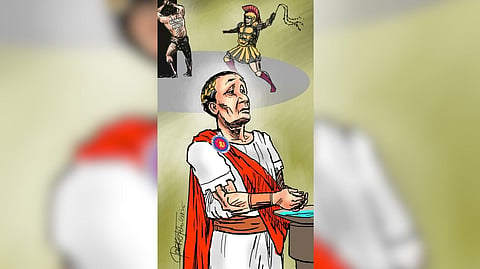
- NEWS
- the EDIT
- COMMENTARY
- BUSINESS
- LIFE
- SHOW
- ACTION
- GLOBAL GOALS
- SNAPS
- DYARYO TIRADA
- MORE

It didn’t come in the form of a press conference, a memorandum, or even an official statement. No, the defense of the Department of Budget and Management (DBM) for the flood control fiasco was floated on Facebook — on the personal page of a lower-tier official. That in itself says plenty: plausible deniability, digital edition.
The post reads like a bureaucrat’s confessional, the kind that begins with: Don’t look at us, we just push the papers. According to this line of reasoning, the DBM had nothing to do with the questionable flood control projects that slipped into the 2026 National Expenditure Program (NEP).
The Department of Public Works and Highways (DPWH) drew up the list, the DBM merely collated it, and if ghosts and duplicates found their way in — well, that’s somebody else’s haunting. Rep. Ronaldo Puno called the bunch at DBM “stenographers.” Pencil pushers, more like it, if you ask us.
Clever, if only they didn’t undermine the Constitution. Article VI, Section 25, is clear enough: The President submits a budget to Congress “as the basis for the general appropriations bill.”
The DBM prepares this budget for the President. Preparing means collecting, evaluating, consolidating, reviewing — not just stapling. To suggest the DBM has no duty to spot recycled or bloated items is like claiming the cashier at a bank can hand over counterfeit bills and say, sorry, I’m not a forensics expert.
The DBM official also raised the agency’s lack of engineers to check whether projects are technically sound. But no one expects budget analysts to calculate water flows in a Pampanga canal. What they are expected to do is notice if the same canal had been funded last year. That’s not hydraulic engineering — that’s common sense.
By the time the NEP reaches Congress, it would have gone through DBM’s filters. If anomalies survived that journey, DBM is not a bystander. It is, at minimum, an accessory. You don’t get to hand over a document with billions of pesos worth of errors and say, our hands are clean. That’s not accountability — that’s being Pontius Pilate.
And then there’s the bit about “errata sheets.” Malacañang and DBM whisper that corrections can only be coursed through those neat little tables of typos and decimal errors. Fine, but only for clerical slips.
When billions in ghost projects show up in the budget, calling it “errata” is like calling a landslide a minor landscaping issue. Nothing in the Constitution prohibits Congress from demanding a fuller, cleaner submission. The Supreme Court itself, in Philconsa v. Enriquez and Araullo v. Aquino, reminds us that budget transparency is not optional.
But here’s where the hypocrisy thickens: Congress is no innocent party. Lawmakers receive the NEP with all its ghosts, duplicates, and suspicious insertions — but what do they do? They debate endlessly about their “power of the purse,” then quietly accommodate the same projects in their districts, whether for patronage or pork.
Instead of parsing the budget, Congress too often massages it, tucks in its own insertions, and later feigns surprise when scandals erupt. Complicity dressed up as oversight.
In truth, the DBM and Congress are co-authors of this farce. One feeds the other; one washes its hands, the other looks away. The people end up flooded — literally — while both institutions pass the blame back and forth like a hot potato.
What the DBM’s Facebook defense really reveals is a mindset. It’s the same shrug that says: we don’t build, we just budget. True enough. But the power to budget carries the power to bury—or to expose. If DBM abdicates that responsibility, then who is guarding the nation’s purse? And if Congress keeps rubber-stamping ghost projects, what exactly are they guarding?
In the end, the attempt to wash their hands only makes them look dirtier. A Facebook post may spare DBM the weight of an official statement, and congressional hearings may spare lawmakers the burden of real reform. But neither will wash away accountability.
